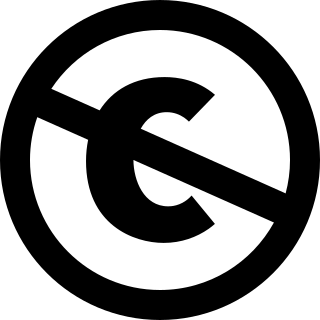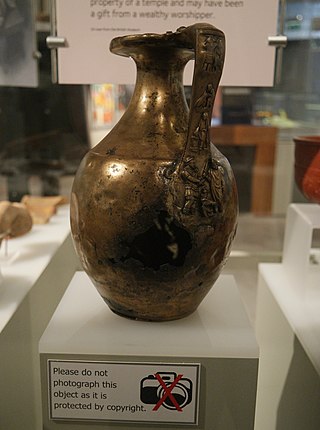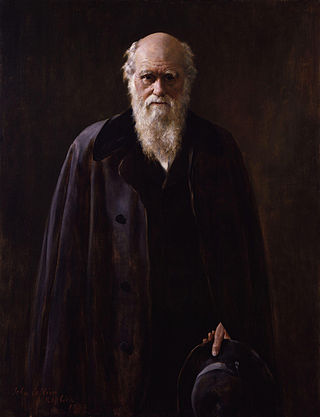Related Research Articles
A copyright is a type of intellectual property that gives its owner the exclusive right to copy, distribute, adapt, display, and perform a creative work, usually for a limited time. The creative work may be in a literary, artistic, educational, or musical form. Copyright is intended to protect the original expression of an idea in the form of a creative work, but not the idea itself. A copyright is subject to limitations based on public interest considerations, such as the fair use doctrine in the United States.

Open-source licenses facilitate free and open-source software (FOSS) development. Intellectual property (IP) laws restrict the modification and sharing of creative works. Free and open-source software licenses use these existing legal structures for the inverse purpose of granting freedoms that promote sharing and collaboration. They grant the recipient the rights to use the software, examine the source code, modify it, and distribute the modifications. These licenses target computer software where source code can be necessary to create modifications. They also cover situations where there is no difference between the source code and the executable program distributed to end users. Open-source licenses can cover hardware, infrastructure, drinks, books, and music.

A license (US) or licence (Commonwealth) is an official permission or permit to do, use, or own something.
A work made for hire, in copyright law in the United States, is a work that is subject to copyright and is created by employees as part of their job or some limited types of works for which all parties agree in writing to the WFH designation. Work for hire is a statutorily defined term and so a work for hire is not created merely because parties to an agreement state that the work is a work for hire. It is an exception to the general rule that the person who actually creates a work is the legally-recognized author of that work. In the United States and certain other copyright jurisdictions, if a work is "made for hire," the employer, not the employee, is considered the legal author. In some countries, this is known as corporate authorship. The entity serving as an employer may be a corporation or other legal entity, an organization, or an individual.

Criticism of copyright, or anti-copyright sentiment, is a dissenting view of the current state of copyright law or copyright as a concept. Critics often discuss philosophical, economical, or social rationales of such laws and the laws' implementations, the benefits of which they claim do not justify the policy's costs to society. They advocate for changing the current system, though different groups have different ideas of what that change should be. Some call for remission of the policies to a previous state—copyright once covered few categories of things and had shorter term limits—or they may seek to expand concepts like fair use that allow permissionless copying. Others seek the abolition of copyright itself.

Remix culture, also known as read-write culture, is a term describing a culture that allows and encourages the creation of derivative works by combining or editing existing materials. Remix cultures are permissive of efforts to improve upon, change, integrate, or otherwise remix the work of other creators. While combining elements has always been a common practice of artists of all domains throughout human history, the growth of exclusive copyright restrictions in the last several decades limits this practice more and more by the legal chilling effect. In reaction, Harvard law professor Lawrence Lessig, who considers remixing a desirable concept for human creativity, has worked since the early 2000s on a transfer of the remixing concept into the digital age. Lessig founded the Creative Commons in 2001, which released a variety of licenses as tools to promote remix culture, as remixing is legally hindered by the default exclusive copyright regime applied currently on intellectual property. The remix culture for cultural works is related to and inspired by the earlier Free and open-source software for software movement, which encourages the reuse and remixing of software works.

A replica is an exact copy or remake of an object, made out of the same raw materials, whether a molecule, a work of art, or a commercial product. The term is also used for copies that closely resemble the original, without claiming to be identical. Also has the same weight and size as original.
Various copyright alternatives in an alternative compensation systems (ACS) have been proposed as ways to allow the widespread reproduction of digital copyrighted works while still paying the authors and copyright owners of those works. This article only discusses those proposals which involve some form of government intervention. Other models, such as the street performer protocol or voluntary collective licenses, could arguably be called "alternative compensation systems" although they are very different and generally less effective at solving the free rider problem.

Public-domain software is software that has been placed in the public domain, in other words, software for which there is absolutely no ownership such as copyright, trademark, or patent. Software in the public domain can be modified, distributed, or sold even without any attribution by anyone; this is unlike the common case of software under exclusive copyright, where licenses grant limited usage rights.

A copyfraud is a false copyright claim by an individual or institution with respect to content that is in the public domain. Such claims are unlawful, at least under US and Australian copyright law, because material that is not copyrighted is free for all to use, modify and reproduce. Copyfraud also includes overreaching claims by publishers, museums and others, as where a legitimate copyright owner knowingly, or with constructive knowledge, claims rights beyond what the law allows.

In law, abandonment is the relinquishment, giving up, or renunciation of an interest, claim, privilege, possession, civil proceedings, appeal, or right, especially with the intent of never again resuming or reasserting it. Such intentional action may take the form of a discontinuance or a waiver. This broad meaning has a number of applications in different branches of law. In common law jurisdictions, both common law abandonment and statutory abandonment of property may be recognized.

Copyleft is the legal technique of granting certain freedoms over copies of copyrighted works with the requirement that the same rights be preserved in derivative works. In this sense, freedoms refers to the use of the work for any purpose, and the ability to modify, copy, share, and redistribute the work, with or without a fee. Licenses which implement copyleft can be used to maintain copyright conditions for works ranging from computer software, to documents, art, scientific discoveries and even certain patents.

The Agreement on Trade-Related Aspects of Intellectual Property Rights (TRIPS) is an international legal agreement between all the member nations of the World Trade Organization (WTO). It establishes minimum standards for the regulation by national governments of different forms of intellectual property (IP) as applied to nationals of other WTO member nations. TRIPS was negotiated at the end of the Uruguay Round of the General Agreement on Tariffs and Trade (GATT) between 1989 and 1990 and is administered by the WTO.

Bridgeman Art Library v. Corel Corp., 36 F. Supp. 2d 191, was a decision by the United States District Court for the Southern District of New York, which ruled that exact photographic copies of public domain images could not be protected by copyright in the United States because the copies lack originality. Even though accurate reproductions might require a great deal of skill, experience and effort, the key element to determine whether a work is copyrightable under US law is originality.
The philosophy of copyright considers philosophical issues linked to copyright policy, and other jurisprudential problems that arise in legal systems' interpretation and application of copyright law.
The public domain (PD) consists of all the creative work to which no exclusive intellectual property rights apply. Those rights may have expired, been forfeited, expressly waived, or may be inapplicable. Because no one holds the exclusive rights, anyone can legally use or reference those works without permission.
Limitations and exceptions to copyright are provisions, in local copyright law or the Berne Convention, which allow for copyrighted works to be used without a license from the copyright owner.
Digital rights management (DRM) is the management of legal access to digital content. Various tools or technological protection measures (TPM) like access control technologies, can restrict the use of proprietary hardware and copyrighted works. DRM technologies govern the use, modification and distribution of copyrighted works and of systems that enforce these policies within devices. DRM technologies include licensing agreements and encryption.

In July 2009, lawyers representing the National Portrait Gallery of London (NPG) sent an email letter warning of possible legal action for alleged copyright infringement to Derrick Coetzee, an editor/administrator of the free content multimedia repository Wikimedia Commons, hosted by the Wikimedia Foundation.
The protection of intellectual property (IP) of video games through copyright, patents, and trademarks, shares similar issues with the copyrightability of software as a relatively new area of IP law. The video game industry itself is built on the nature of reusing game concepts from prior games to create new gameplay styles but bounded by illegally direct cloning of existing games, and has made defining intellectual property protections difficult since it is not a fixed medium.
References
- ↑ 'This is the Public Domain' Mute Magazine May 9, 2007 alternate link
- ↑ Press release from the Royal College of Art archive link
- ↑ "This is the Public Domain in Arts & Ecology magazine archive link
- ↑ Haring Woods Associates
- ↑ California College of the Arts archive link
- ↑ This is the Public Domain website
- Martin, Ronald Javier (2017). Air tight : polemics at the intersection of art, technology and the public domain (S.M. in Art, Culture and Technology thesis). Other contributors: Massachusetts Institute of Technology. Department of Architecture. MIT. hdl:1721.1/111490.
- Fava, Sergio (2013). Environmental Apocalypse in Science and Art: Designing Nightmares. Routledge. ISBN 9780415634014.
- Selzer, Shane Aslan; Purves, Ted, eds. (2014). What We Want Is Free, Second Edition. State University of New York Press. pp. 111, 177–178. ISBN 9781438453156.
- Angus, John (2018). "Landed (Freeman's Wood)". In Bruun, Maja Hojer; Cockburn, Patrick Joseph; Risager, Bjarke Skærlund; Mikkel, Thorup (eds.). Contested Property Claims. Routledge. ISBN 9780203712153.